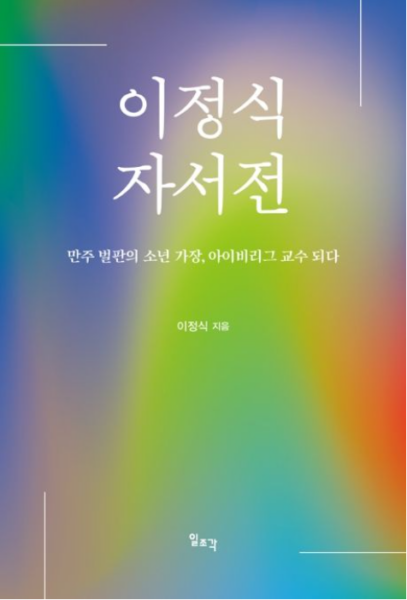A Story About Life More Interesting Than a Novel

Young Bum Kwon, CEO & Founder of YoungLimWon Soft-Lab
<永-Way : CEO’s 53th Remarks at YoungLimWon Soft-Lab>
“A Story About Life More Interesting Than a Novel”
July 1, 2024
Last weekend, I read the autobiography of the late Professor Emeritus Lee Jung-sik of Penn State University. The book is thick, but I managed to read about two-thirds of it because it was so captivating. It reaffirmed my belief that a life full of twists and turns can be more fascinating than fiction.
Born in 1931 in Anju, South Pyongan Province, he moved to Hankou, China, at the age of eight due to his father’s business. There, he attended Meiji Elementary School, primarily for Japanese children, for two years and became nearly as proficient in Japanese as the native students. This later proved invaluable when he became a professor teaching Japanese politics and culture.
In 1941, due to his father’s failing business, he returned to Pyongyang at the age of ten. With Japan initiating the Pacific War, the strict Japanese imperialization education was thoroughly implemented even at Myongryun Elementary School.
In 1943, after failing the middle school entrance exam at age twelve, he joined his family who had moved to Manchuria and enrolled in Liaoyang Commercial School. However, at fourteen, his father went missing, forcing him to become the breadwinner of the family.
His first job was as an assistant to an unlicensed doctor, where he did all sorts of cleaning and laundry, and disinfected and prepared medicine for patients with gonorrhea and syphilis. Later, when cholera cases surged, he even administered cholera vaccines due to a lack of hands.
His next job was at a cotton mill, where he initially worked 12-hour shifts in the cold, hauling cotton and cleaning animal dung. Eventually, he caught the eye of his superiors and transitioned to an office job handling accounting and bookkeeping. However, rapid promotions drew jealousy from the Chinese, and when the Chinese Communist Army took over Manchuria, he was forced out.
Realizing there was no way to secure food for his family amid the Chinese Civil War, he decided to return to Pyongyang. Civilian bridge crossings were completely banned due to military movements, but he narrowly managed to secure a boat ride to Sinuiju and then took a train to Pyongyang, where he stayed with his aunt.
His uncle, who had been successful under Japanese rule, had his business taken away by the communists and fled to South Korea. His aunt, left to care for her elderly mother, supported her family by selling rice at the market. Lee, being tall and quick-witted, had no choice but to work diligently as a clerk at the rice store.
This is as far as I read last night. Briefly summarizing his subsequent life, he fled to the south during the Korean War in 1950, joined the National Defense Corps Academy, and with the help of US military officers he met while working as an interpreter, he was able to enroll at UCLA. After graduating, he earned his master’s and doctorate from UC Berkeley.
In 1973, he co-authored “Communism in Korea” with his mentor, Professor Robert Scalapino, which won the Woodrow Wilson Foundation Award, the highest honor from the American Political Science Association.
He served as a tenured professor at the University of Pennsylvania, one of the top 10 Ivy League schools, for over 30 years and passed away as an emeritus professor in 2021.
Reading this book brought me closer to the historical contexts of Japanese rule, Manchukuo, and the post-liberation era. It also reaffirmed the truth that “adversity is the foundation of growth.” The prevalent rote learning and grade-focused education today deprives children of necessary life experiences and instead adds to their stress. I believe the best education fosters the vision and will to pioneer one’s own life.
YB




